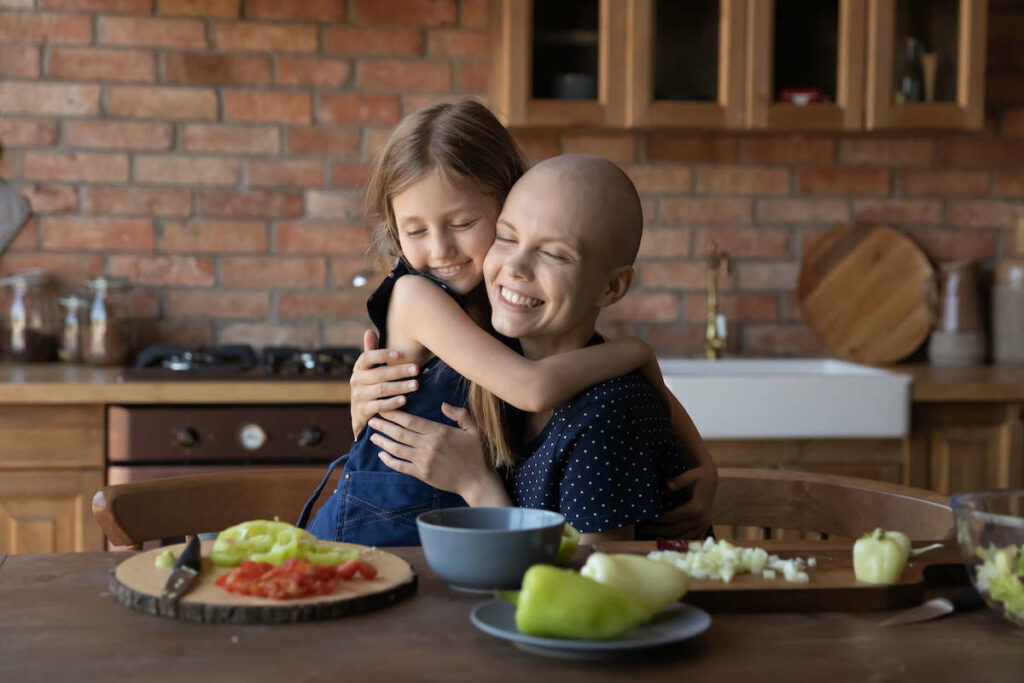Alopecia is no joke. That became the battle cry of the National Alopecia Areata Foundation (NAAF) following the 2022 Academy Awards incident. The NAAF was quick to point out that this disease affects nearly seven million Americans and 147 million people worldwide. “It can be unpredictable and cause significant physical, emotional/mental health, psycho-social, and financial burdens—and there is no cure, effective treatment, or standard of care,” reported the NAAF. (9)
An important aspect of the NAAF statement is that there is no cure or effective treatment, so people with alopecia areata are often left to find solutions for themselves. The question looms: how can integrative medicine practitioners help people with alopecia? As it turns out, integrative medicine has much to offer.
What is alopecia areata?
In Latin, “alopecia” means baldness, and “areata” means patchy. Alopecia areata is an autoimmune condition that causes hair loss via several different types:
- Diffuse hair loss: Lose hair from all areas of the head
- Patches of hair loss: Scalp and body hair loss occurs in one or more coin-sized round patches; this is the most common type of alopecia areata
- Alopecia totalis: Loss of all or nearly all hair on the scalp
- Alopecia universalis: An advanced form of alopecia resulting in a near-to-complete hair loss throughout the entire body (11)(12)

With this autoimmune disease, the immune system believes hair follicles are foreign invaders. When it attacks the follicles, hair falls out and/or hair cannot grow. It’s important to note that alopecia areata is different than androgenic alopecia (male/female pattern baldness), which is patterned hair loss due to a hormonal imbalances rather than the immune system attacking the hair follicles. (14) People with androgenic alopecia seem to have more treatment options than those who develop alopecia areata because androgenic alopecia can have more treatable causes compared to autoimmunity and/or genetics with alopecia areata.
There is a lot we still don’t know about alopecia areata, including the exact cause. While the most widely accepted hypothesis describes alopecia as an autoimmune condition, other risk factors can include emotional stress, environmental factors, physical injury, or other illness; the onset of hair loss oftentimes has no clear explanation. (10) Genetic disorders of immune-related genes can also play a role. People with alopecia areata are more likely to have a family member with an autoimmune disease. They are also at higher risk of developing other autoimmune diseases, such as lupus (an autoimmune condition that can affect the joints, skin, and other parts of the body), thyroid diseases, or vitiligo (skin pigment loss causing whitish patches). (10)
For many individuals with alopecia, hair regrows, but that may not indicate a full recovery. Alopecia may continue to affect the remaining hair, potentially causing new hair loss in other places. Hair regrowth is more likely for individuals with:
- Later age of onset
- Less severe hair loss
- No family history of alopecia
- No nail changes (e.g., ridges) (11)
An integrative approach to addressing alopecia areata
Presently, conventional medicine does not have much to offer patients with alopecia areata, especially those with the rarer forms of alopecia totalis and alopecia universalis. The most common treatments include local steroid injections to the alopecia site combined with topical retinoids; however, these treatments are often not effective. (12)
While the Food and Drug Administration presently has not approved any new treatments for alopecia areata, there is an ongoing research effort to find new drugs to treat this illness, including Janus kinase (JAK) inhibitors and biologic response modifiers that are presently used to treat other autoimmune conditions such as rheumatoid arthritis, psoriatic arthritis, or atopic dermatitis (eczema). (11)

An integrative approach could help manage potential side effects and interactions as these new drugs are approved for alopecia areata.
In addition, there are other ways integrative practitioners can help patients with alopecia areata. While there is no cure or treatment, the integrative practitioner can test to determine if there are underlying contributors to the condition such as food allergies or sensitivities, thyroid issues, hormonal imbalances, nutrient deficiencies, or abnormalities in the gut microbiome. (7)
According to a 2019 review, while many natural products show efficacy with androgenic alopecia, there is limited and only preliminary evidence for alopecia areata with the following:
- Acupuncture
- Capsaicin topical cream
- Essential oils topically, such as rosemary and lavender in a carrier oil such as jojoba or grape seed
- Garlic gel topically
- Vitamin D and zinc orally to correct deficiency (5)
The gut microbiome may also hold some promise when it comes to alopecia areata patients who do not have a genetic factors. For example, several case studies involving patients with alopecia areata have demonstrated significant hair regrowth when addressing a C. difficile infection with a fecal microbiota transplant (FMT). (16) While research is still preliminary and there is no gut microbiome treatment approved for alopecia areata, correcting imbalance in the gut microbial community (dysbiosis) and utilizing gut microbiome interventions may prove to be an effective strategy for hair regrowth. (2)
One area where integrative medicine can excel when helping patients with alopecia areata is by enhancing mental health.
Addressing mental health
The mental health effects of alopecia areata can be daunting. In general, psychiatric disorders such as depression, anxiety, social phobia, or paranoid disorder are much more common in people with alopecia areata compared to the general public. (6) Studies have consistently shown that people with alopecia areata have poorer quality of life and the extent of their difficulty correlates with the extent of their hair loss: the more hair loss, the increased chance of mental health issues and reduced quality of life. (3) In one survey, 85% of the respondents said that coping with alopecia areata was a challenge on a daily basis, which included trying to conceal their condition, as well as the financial burden of buying wigs and other products. (8)
Because the condition is so unpredictable and there are no effective treatments yet, patients report significant feelings of helplessness, insecurity, self-consciousness, and being worried about the disease recurring or worsening. (1) Presently, conventional medicine also offers little in the way of mental health support for these patients.
Integrative practitioners can help because they utilize a variety of techniques to address mental health issues that may benefit patients with alopecia areata including:
- Lifestyle medicine such as diet, exercise, sleep, and other strategies
- Mind-body techniques such as meditation, yoga, and other strategies
- Nutraceutical treatments such as omega-3 fatty acids, select amino acids, herbs, and other nutrients (4)
According to a 2019 study involving individuals with alopecia areata, increased physical activity was associated with improved mental health and less depression, anxiety, and stress. (15) Correcting dysbiosis via diet has also been shown to be effective in a couple of case reports; however, more research on diet and alopecia areata is needed. (13)
The bottom line
Alopecia areata is not just a cosmetic condition. It can be emotionally, financially, mentally, and physically draining. In addition, some people with alopecia areata are at increased risk of gut dysbiosis, nutrient deficiency, and the development of other autoimmune conditions. Integrative practitioners have a variety of ways to support people with alopecia areata from a diet, lifestyle, and mind/body perspective. Enhanced awareness of the condition is also a step in the right direction.
- Aldhouse, N., Kitchen, H., Knight, S. Macey, J., Nunes, F. P., Dutronc, Y., Mesinkovska, N., Ko, J. M., King, B. A., & Wyrwich, K. W. (2020). “You lose your hair, what’s the big deal? I was so embarrassed, I was so self-conscious, I was so depressed:” a qualitative interview study to understand the psychosocial burden of alopecia areata. Journal of Patient-Reported Outcomes, 4(76).
- Barquero-Orias, D., Moreno-Arrones, O., & Vano-Galvan, S. (2021). Alopecia and the microbiome: a future therapeutic target? Actas Dermo-Sifiliograficas, 112(6), 495-502.
- Davis, D. S., & Callender, V. D. (2018). Review of quality of life studies in women with alopecia. International journal of women’s dermatology, 4(1), 18–22.
- Ee, C., Lake, J., Firth, J., Hargraves, F., de Manincor, M., Meade, T., Marx, W., & Sarris, J. (2020). An integrative collaborative care model for people with mental illness and physical comorbidities. International Journal of Mental Health Systems, 14, 83.
- Hosking, A., Juhasz, M., & Mesinkovska, N. (2019). Complementary and alternative treatments for alopecia: a comprehensive review. Skin Appendage Disorders, 5, 72-89.
- Hunt, N., & McHale, S. (2005). The psychological impact of alopecia. BMJ (Clinical research ed.), 331(7522), 951–953.
- McCormack, J. (2022, April 27). An integrative approach could curb hair loss due to alopecia. Integrative Practitioner. https://www.integrativepractitioner.com/disease-illness/2022-04-27-an-integrative-approach-could-curb-hair-loss-due-to-alopecia
- Mesinkovska, N., King, B., Mirmirani, P., Ko, J., & Cassella, J. (2020). Burden of illness in alopecia areata: a cross-sectional online survey study. Journal of Investigative Dermatology Symposium Proceedings, 20(1), S62-S68.
- National Alopecia Areata Foundation. (2022, Mar 23). NAAF responds to academy awards incident. https://www.naaf.org/news-room/naaf-responds-to-academy-awards-incident
- National Health Institute National Library of Medicine. (2018, June 1). MedlinePlus alopecia areata. https://medlineplus.gov/genetics/condition/alopecia-areata/#causes
- National Institute of Arthritis and Musculoskeletal and Skin Diseases. (2021, April 2). Alopecia areata. https://www.niams.nih.gov/health-topics/alopecia-areata
- Olayinka, J. T., Richmond, J. M. (2021). Immunopathogenesis of alopecia areata. Current Research in Immunology, 2:7-11.
- Pinto, D., Sorvellini, E., Rinaldi, F., & Guiliani, G. (2019). Diet and microbiome influence on alopecia areata: experience from case reports. Journal of Nutritional Medicine and Diet Care, 5(1).
- Qi, J., & Garza, L. A. (2014). An overview of alopecias. Cold Spring Harbor perspectives in medicine, 4(3), a013615.
- Rajoo, Y., Wong, J., Cooper, G., Raj, I. S., Castle, D. J., Chong, A. H., Green, J., & Kennedy, G. A. (2019). The relationship between physical activity levels and symptoms of depression, anxiety and stress in individuals with alopecia areata. BMC Psychology, 7(48).
- Rebello, D., Wang, E., Yen, E., Lio, P. A., & Kelly, C. R. (2017). Hair Growth in Two Alopecia Patients after Fecal Microbiota Transplant. ACG case reports journal, 4, e107.





